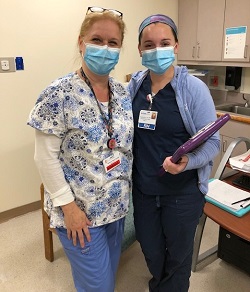Code Sunshine

Pictured is Kellie Morse, RN (left) and Amanda Rovi, RN, who are the clinical leaders on West-1 at CHA Everett Hospital.
“Here comes the sun, and I say...It's all right.” Code Sunshine started in late April 2020 as staff and providers at Cambridge Health Alliance (CHA) responded to the COVID-19 surge in Massachusetts. The song “Here Comes the Sun” by the Beatles rang out in the hallways at CHA Cambridge and Everett Hospitals each time a COVID-19 positive patient recovered from a hospital stay and headed home to their family, friends and loved ones.
“Everytime we hear that song played, it makes us so happy to know that we were able to help somebody get through these difficult times and return home ,” said Amanda Rovi, RN, a clinical leader on West-1 at CHA Everett Hospital. The song was chosen by staff at CHA as a way to come together as a community and celebrate the victories of discharged patients.
Amanda joined CHA in January 2015 after graduating from Salem State University School of Nursing and began as a staff nurse on West-1, one of CHA’s medical/surgical and telemetry units. She moved into the clinical leader position in February 2020 after several years on the hospital floors working in the preceptor and charge nurse roles. Amanda, along with clinical leaders Kellie Morse (West-1) and Sharen Frolien (West-3) stepped into the new role which were created to provide unit nurses with additional resources on day and evening shifts.
Clinical Leaders at CHA
“Nurse clinical leaders at CHA are brand new positions that fall outside of the staffing pattern for nurses,” said Amanda. “The flexibility allows us to support nurses on the frontline with care management and jump into critical situations to assist our colleagues.” The Clinical Leader role incorporates the charge nurse position and gives staff nurses extra support. “We do a multitude of different things on the unit and are there for everybody from the nursing assistants to the nurses, all parts of the team, to make sure we provide the best care to our patients,” said Amanda.
“As a smaller community hospital, we get to know everyone by their first name,” said Amanda. “In an emergency situation, there’s nothing better than knowing who you are working with and their strengths.” Another benefit of working at CHA in Amanda’s opinion is the focus on professional development and continuing education. “Nursing leadership gives each nurse every opportunity to continue their education and strengthen their skills. Having also begun as a new graduate nurse myself, I think it’s so great what CHA has done with the development of the New Graduate Nurse Residency Program. This program gives nurses the chance to gain experience and strengthen their confidence.”
COVID-19 Surge in Massachusetts
When COVID-19 began to impact Massachusetts in late March, the clinical leader’s job became focused on infection prevention and helping nurses understand how to use personal protective equipment (PPE). “Our nurses stepped up on the hospital floors to deliver step down level of care which was outside of their comfort zone,” said Amanda. In April, CHA increased its ICU capacity, provided step-down level care on med/surg units, created two new comfort care units, and opened an alternate care site in order to manage the COVID-19 surge in its surrounding communities. Furthermore, 250 staff members were redeployed to support acute and critical care needs.
“COVID-19 is challenging because it affects people of every age in different ways, and a patient’s hospital course can be difficult to predict. Some patients who test positive have mild symptoms, while others are requiring ICU level care” said Amanda. For Amanda and the nursing staff, spending the last few hours with a patient before they leave the hospital is the most rewarding. “Knowing that a patient gets to go home after a long hospital stay always brings us joy, and makes our job as a nurse just that much more rewarding”.
In order to care for patients and keep staff safe, CHA now screens every patient who is admitted and takes people’s temperature when they arrive. Visitors and staff are required to wear masks and extra cleaning measures happen every day. “It’s important to continue getting routine care if you are a CHA patient,” said Amanda. “Don’t let aches and pains get worse and advance into something far more difficult to manage.” Now is a great time to connect with your care team. Visit www.challiance.org today.
Disclaimer
This articles provide general information for educational purposes only. The information provided in this article, or through linkages to other sites, is not a substitute for medical or professional care, and you should not use the information in place of a visit, call consultation or the advice of your physician or other healthcare provider.